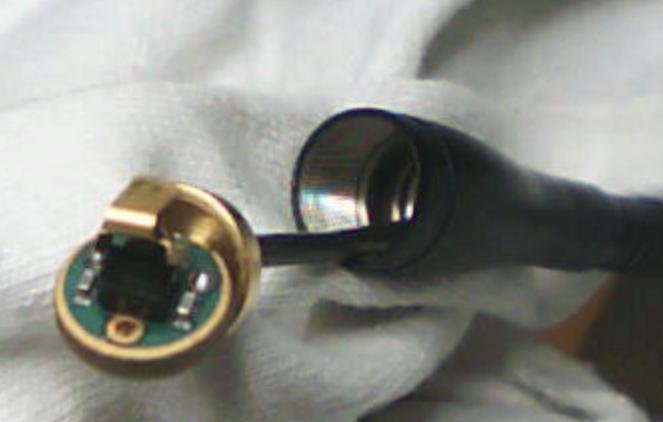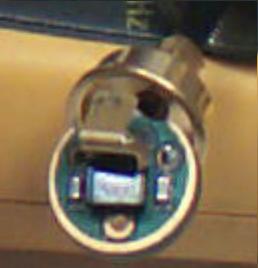Mic repair
It is kind of a long story, but I am looking at seeing trying a repair on a shure mx412 condenser mic. This mic has a history of random crackling. My first question is, can anyone help me identify what this is on the mic head, and who makes it? The factory guy said something about a FET in the head. The letters/numbers on the black object are K660 and E46E.
Now, the rest of the story.
We have been using this brand of mics for about 5 years in our church. Originally we bought one of these mics, and have had no trouble with it. In later years we purchased another mic of the same part number. I noticed right away that the preamp noise level was a lot lower on these new mics, which I though was great. This points to a different preamp design, which I believe is to combat all the new electronic devices, according the the shure representative. The new design is rohs also.
The problem started with low level crackling, which gradually got worse. Eventually we tracked it down to the newer mic by a process of elimination. So fine, I replace it with a brand new mic of the same part number. After a month or so, the problem started at a real low level. As the mic got used and moved around,(it is a goosneck style) the exact same problem showed itself. So, we tried everything in the books. We ran new mic cable strait from the mixer to the mics. We swapped the mic around with the old one. The problem always followed the new mic. No other condenser mics created this problem, so I ruled out the mixer and the cable.
Now, the rest of the story.
We have been using this brand of mics for about 5 years in our church. Originally we bought one of these mics, and have had no trouble with it. In later years we purchased another mic of the same part number. I noticed right away that the preamp noise level was a lot lower on these new mics, which I though was great. This points to a different preamp design, which I believe is to combat all the new electronic devices, according the the shure representative. The new design is rohs also.
The problem started with low level crackling, which gradually got worse. Eventually we tracked it down to the newer mic by a process of elimination. So fine, I replace it with a brand new mic of the same part number. After a month or so, the problem started at a real low level. As the mic got used and moved around,(it is a goosneck style) the exact same problem showed itself. So, we tried everything in the books. We ran new mic cable strait from the mixer to the mics. We swapped the mic around with the old one. The problem always followed the new mic. No other condenser mics created this problem, so I ruled out the mixer and the cable.







Comments
It's rather unlikely that two mics of the same type would fail in the same way, so I'd suspect something common to both...such as the phantom power coming from the sound board. Is there anyway you can take a look at the voltage with a scope? You'd have to do this while loading the supply.
Do the "other condenser" mics require phantom power?
What type of sound board are you running?
And, can't make out what's on the mic head as the picture resolution is too small to clearly show.
Regards,
DJ
▔▔▔▔▔▔▔▔▔▔▔▔▔▔▔▔▔▔▔▔▔▔▔▔
I would use your reasoning too, davejames, but I find it real odd that the oldest mx412 does not exhibit this problem, even when plugged in the same wire, and mixer preamp.
All the other mics require phantom power. I am using an audio technica (at873) temporary mic which has been working perfectly.
We are using a soundcraft spirit.
These pics aren't the best, I don't have what I need for better resolution.
Nice board!
Later,
DJ
▔▔▔▔▔▔▔▔▔▔▔▔▔▔▔▔▔▔▔▔▔▔▔▔
http://www.soundonsound.com/sos/mar05/articles/condensers.htm
▔▔▔▔▔▔▔▔▔▔▔▔▔▔▔▔▔▔▔▔▔▔▔▔
I only mention·this because that crackling is nearly always an issue with the capsule; there really isn't much to go go wrong in the preamp itself.
▔▔▔▔▔▔▔▔▔▔▔▔▔▔▔▔▔▔▔▔▔▔▔▔
The tech guys have responded and they offer the possibility of "a bad batch" of product. Numerous stories were related telling of poor solder joints and just overall sloppy workmanship from the manufacturer - - Shure, no less!
Any chance the problem mics are still under warranty?
Later,
DJ
▔▔▔▔▔▔▔▔▔▔▔▔▔▔▔▔▔▔▔▔▔▔▔▔
IF you are holding the mic and touch the console (phantom power source), does the noise improve or get worse?
These are pretty ginger mics (delicate). Have never liked them, but they are sure handy for mobility and out of sight.
I might suspect solder joints.
Would wonder if the ground pin (3prong plug) is not making great contact.
They don't look like gold contacts....but plug/unplug the socket a few times and get a sense of whether it's a snug fit.
Also, clean the plugs/sockets if you can....oxidation might built up if it's being handled a lot.
▔▔▔▔▔▔▔▔▔▔▔▔▔▔▔▔▔▔▔▔▔▔▔▔
<FONT>Steve
What's the best thing to do in a lightning storm? "take a one iron out the bag and hold it straight up above your head, even God cant hit a one iron!"
Lee Travino after the second time being hit by lightning!
I have half a mind to reflow the head and use some lead solder. Those joints don't look that great to me.
In my original search for the problem, I had found a bad cable that was grounding one side of the phantom, and figured, this is my problem, but the problem continued. One could think that this ruined the mic, but once again, having swapped mics around a bit, the problem did not exhibit itself in the other mics.